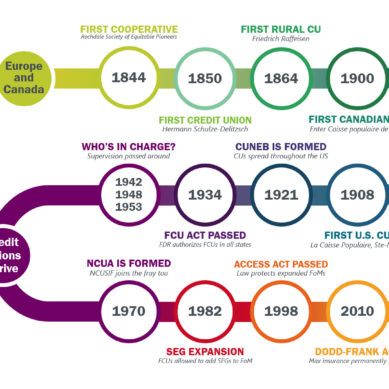In yesterday’s article, Chip Filson expressed his reaction to Kyle Hauptman’s first NCUA board meeting, and why he felt it was positive for several reasons.
He cited Hauptman’s “breaking from tradition” by seemingly not reading prepared remarks, instead speaking critically about the NCUA and its current practices. How Hauptman recognized where NCUA funding comes from—its credit union members—and why that is a rarely acknowledged fact by agency leaders.
Filson also expressed hope that by hiring industry veteran Sarah Canepa Bang as his senior advisor, Hauptman might escape the “bureaucratic vortex” that sucks in freshmen board members.
I am less optimistic.
Career politicians have a tendency to say what their constituents want to hear early on and slip into self-interest and political expectations the further they get into their tenure. We need look no further than who Hauptman replaced for evidence.
McWatters came in guns blazing
Looking back on McWatters’ time with the NCUA board, we see a cautionary tale. In March 2019, Chip summarized McWatters’ early tenure:
“McWatters’ initial participation in 2014 as a minority board member was very encouraging for credit unions. He was bright, willing to listen, unfailingly polite and responsive to issues brought to his attention. . .
“McWatters repeatedly showed, while in the minority on the board, the competence to challenge the regulatory status quo. His long essay style, legal briefs of dissents were a level of effort and insight never seen at the board level.”
He was a voice of dissent, speaking out against Matz and Metsger, and he was lauded for it. In 2015, Frank Diekmann described McWatters’ rising popularity:
“When NCUA board members make appearances at credit union events, typically the applause heard when they are announced is of the polite variety. Not so with NCUA Board Member Mark McWatters, who is usually the “1” in 2-1 votes on the NCUA board. McWatters has been outspoken against the agency’s risk-based capital proposal (and even the agency’s authority to issue it), among other regulations. How popular has he become? McWatters wasn’t in attendance at the recent Ohio league meeting in Columbus, but when one speaker mentioned his name, it got a spontaneous round of applause from the audience.”
Less applause on the way out
By the end of his tenure, praise for McWatters was fewer and farther between.
When asked about the legacy McWatters would leave behind, Filson replied: “His promising potential was unmet, and he was a major disappointment in the way he led us on. . . Whether the result of his professional style, his philosophy of the board’s role or just ennui, he ended up adopting the agency thinking he had so decisively and accurately critiqued. . . In leadership, he gave up. No efficiency, effectiveness, transparency, or full accountability achieved. Why is open to interpretation. Mine would be that he lost any commitment to the credit union mission. His primary goal was protecting the agency and its resources. He became the bureaucrat he had initially challenged so eloquently in Pennsylvania in 2015.”
Some who once thanked McWatters for being an outspoken opponent to the status quo later hoped his replacement would be “a small if not major course adjustment.” Is Hauptman that course adjustment?
Credit unions want a voice of dissent
Responding to Frank Diekmann’s description of McWatters’ early reputation, CU*Answers CEO Randy Karnes suggested that what credit unions were cheering was not necessarily McWatters’ ideas, but the very act of being a voice of challenge. “I vote for VOICE, I vote for the chance to hear the DEBATE, and I vote for the HOPE that the individuals on the Board can actually think past their assignments from those who assign them,” said Karnes.
Filson proposes ways Hauptman might learn from McWatters. Questions he should ask himself to prevent sliding into the bureaucratic abyss. Questions like “what is my personal commitment to the position?” and “to whom am I accountable for my decisions?”
These are all great questions. But for them to be effective, Hauptman will need to ask them of himself regularly.
I hope Hauptman heeds the warnings. And while I am glad to see he’s starting out on the right foot, I will watch his tenure with a degree of skepticism.
Today’s board meeting may provide a little more evidence of what kind of board member Hauptman will be early on. But don’t count on it to be who he is by the end of his time on the board.
Just as Hauptman should regularly check on himself, so too should we check on him. As Karnes says, it is our collective responsibility to “raise our voice when the Board is deaf to its responsibilities to represent us as consumers and owners of credit unions.”
























































chip filson#1
Excellent article about the evolution of board member’s views. How do cu’s keep track of this trend and help to raise concerns when and if the member appears to have gotten “Potomac Fever?”